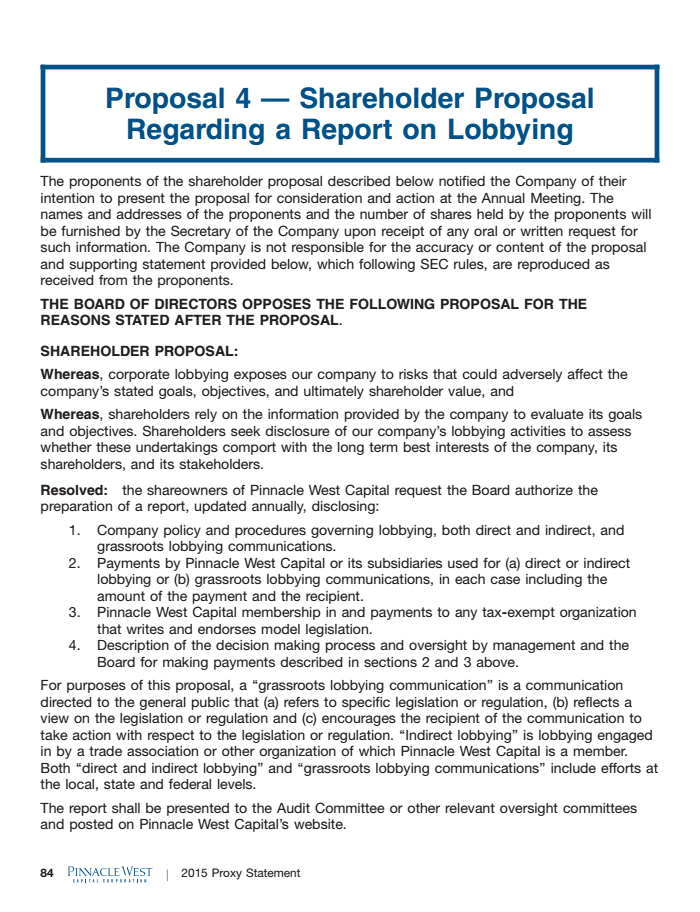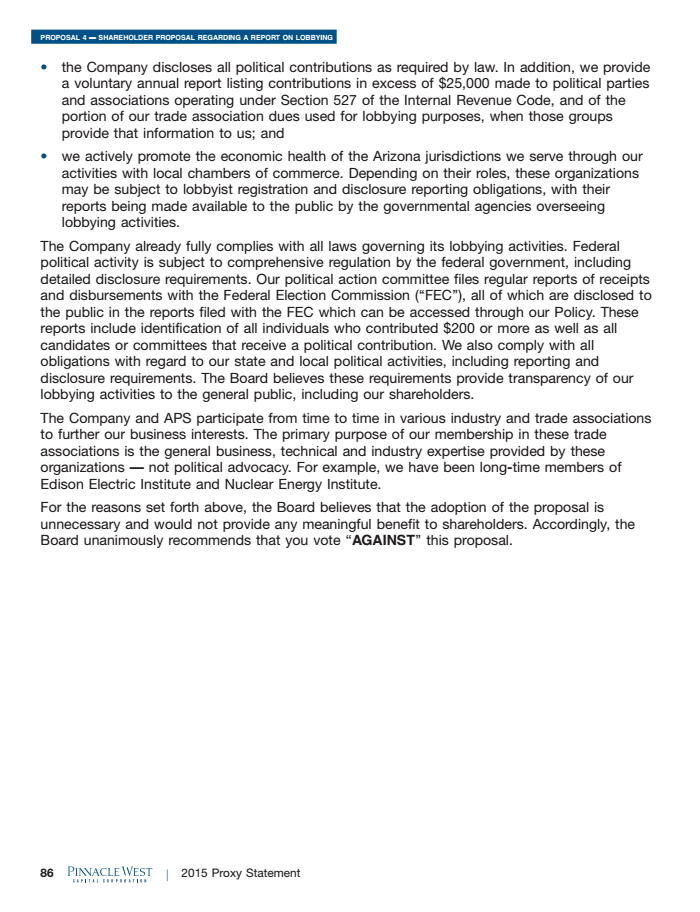By Evan Wyloge | Arizona Center for Investigative Reporting
The question has been formally posed to Pinnacle West shareholders, as part of the publicly-traded company’s 2015 proxy statement, which is used to solicit shareholder input prior to the company’s annual meeting.
While the Pinnacle West board of directors has unanimously panned the proposal, tens of thousands of shareholders have the chance to vote on it, even though it would only be symbolic. The votes will be tallied at the organization’s May 20 shareholder meeting.
Pinnacle West spokesman Alan Bunnell said the organization already complies with all legal disclosure requirements involving election and lobbying spending, and that there would be no value to any greater disclosure. APS and Pinnacle West executives have declined to confirm or deny giving money to “dark money” groups that spent heavily in the 2014 election, particularly to help defeat candidates for the Arizona Corporation Commission who were critical of APS.
As You Sow, a 501(c)3 nonprofit organization, which describes its mission as promoting “environmental and social corporate responsibility through shareholder advocacy, coalition building, and innovative legal strategies,” filed the resolution on behalf of Calvert Investment Management Inc. and First Affirmative Financial Network LLC, which own 2,178 and 49 shares respectively, out of more than 100 million shares.
“Our greatest concern is transparency,” said As You Sow spokeswoman Amelia Timbers. “We think investors deserve to know how the company is spending shareholder dollars, and whether those expenditures are good for the company.”
Timbers said the motivation for the resolution began with APS’ involvement in the 2013 debate over net metering. That year, APS spent $3.7 million to fund publicity campaigns aimed at urging the Arizona Corporation Commission to add a fee to APS customers using the company’s solar net metering program.
Net metering allows energy consumers to use rooftop solar panels to offset their energy bill and sell excess energy back to the utility. APS executives and managers argued in 2013 that because net metering participants also avoid grid maintenance fees, they should be charged $50-$100 per month to be part of the net metering system.
Ultimately, the Corporation Commission approved a roughly $5-7 monthly fee for net metering customers. APS has since asked to have the fee quadrupled.
The 2013 publicity campaign funded by APS painted net metering customers as stealing from non-solar customers.
APS executives eventually admitted the money was at least partially channeled through 60 Plus Association and Prosper Inc., both 501(c)4 “dark money” groups that don’t disclose their donors.
“I would say that put them on a lot of peoples’ radar,” Timbers said. “APS has come to the attention of the investor community nationally… Investors are concerned this lobbying is hurting the company’s brand.”
The shareholder proposal takes aim at “both direct and indirect” lobbying, as well as “grassroots lobbying communications,” which Timbers said would include spending like what took place in 2013.
“The company’s defense to its lobbying is that it’s legal, but just because something is legal doesn’t make it appropriate or good for the company and it’s shareholders,” Timbers said. “We don’t think it makes sense for investors.”
A shareholder proposal vote is non-binding, and would not require the disclosure, but Timbers said the vote will formalize concern that has fomented in the investor community over the perception of possible impropriety.
“Investors can’t force the management to do anything. But it’s an important way for investors to say what they’re seeing and what they’re concerned about,” Timbers said.
Arizona Rep. Ken Clark, D-Phoenix, an outspoken critic of anonymous electioneering, has asked shareholders to support the proposal.
“It seems that the only way to get APS to pay attention to this issue is through it’s shareholders,” Clark said in a video posted to YouTube.








